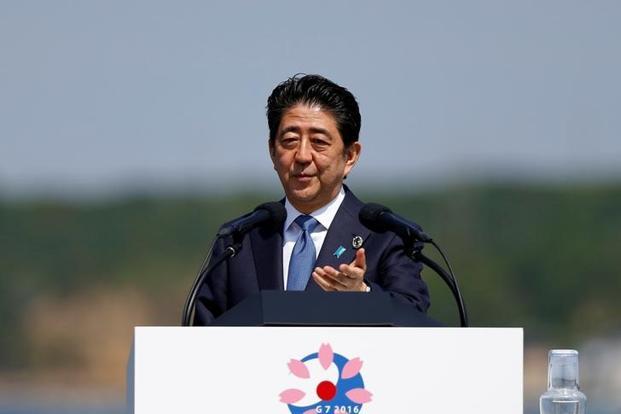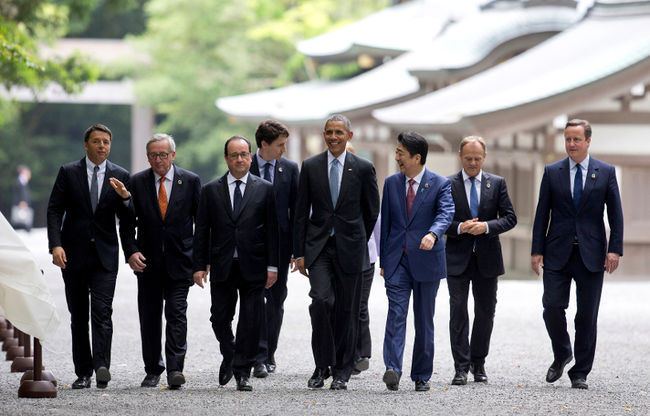
by Admin | Jun 30, 2019 | News, World Leaders in AIWS Award Updates
The prime minister Abe called for the reform of the World Trade Organization, which has been criticized for not functioning properly. He also stressed to leaders the necessity of compiling a new global taxation rule aimed at imposing greater taxes on large information technology companies by next year.
The G20 summit officially started on Friday at noon with a special leaders event on the digital economy. On the first day of the summit, leaders mainly discussed the global economy, trade and investment, and dinner was to be hosted by Abe. On Saturday, the second day of the summit meeting, issues such as climate change, the environment and energy will be discussed.
http://the-japan-news.com/news/article/0005840718

The Boston Global Forum honored Prime Minister Shinzo Abe with the World Leader for Peace and Cybersecurity Award on Global Cybersecurity Day December 12, 2015 at Harvard University Faculty Club.
Prime Minister Abe sent an acceptance speech through video and Japanese Consul General in Boston, representative of Prime Minister Abe, received the Award at Global Cybersecurity Day.
by Robert Whitcomb | Aug 16, 2016 | News
Japanese Prime Minister Shinzo Abe and leaders of some other major U.S. allies are worried about the possible policy of “no first use” of nuclear weapons being considered by the Obama administration. The fear is that such a policy would weaken the ability to deter aggressive dictatorships such as North Korea.
South Korea, France and Britain are also said to have privately communicated their concerns to U.S. officials about a potential declaration by President Obama of such a policy.
If Mr. Obama were to declare a no-first-use policy, it would represent a major change in the U.S. nuclear posture.
To read a Japan Times story on this topic, please hit this link.
by Robert Whitcomb | Jul 12, 2016 | News
Japanese Prime Minister Shinzo Abe has ordered Economic Revitalization Minister Nobuteru Ishihara to draft a range of economic measures to end deflation and raise Japan’s growth potential. The program will include a supplementary fiscal 2016 budget.
The government will submit the fiscal 2016 budget draft to a special session of parliament this fall, Mr. Ishihara told a news conference on July 12.
The Japan Times reported that he had “declined to comment on the size of the economic measures, saying that will be decided at the end of the month using a ‘bottom-up approach.”’
Last December, The Boston Global Forum named Mr. Abe a “Global Leader in Cybersecurity.”
For The Japan Times’s article on this, please hit this link.
by Robert Whitcomb | Jun 30, 2016 | AI World Society Summit
As Chinese expansionism fuels fears all over East Asia, Japan plans to buy new fighter jets worth a total as much as $40 billion. Japan is increasingly worried about Chinese aggression in the East China Sea, where there are a number of islands whose ownership the two nations dispute. It’s also worried about Chinese militarization of the South China Sea, which could threaten freedom of navigation in some of the world’s most important shipping lanes.
The Japan Times reported: “The program will dwarf most recent fighter jet deals in value, likely attracting global contractor interest. But analysts say Japan’s preference for an aircraft that can operate closely with the U.S. military, given close Washington-Tokyo ties, makes a non-U.S. option a long shot.”
Japan seeks a kind of warplane that will let it maintain air superiority over China. China’s warplanes still lag behind those used by the U.S. and its allies, but Beijing has been building its capability, fueling a more muscular security agenda under Japanese Prime Minister Shinzo Abe.
To read The Japan Times’s story on this, please hit this link.

by Admin | May 29, 2016 | World Leaders in AIWS Award Updates
(May 30th, 2016) After warning at the G7 Summit that the global economy faces the risk of another crisis like that of 2008-2009, Japanese Prime Minister Shinzo Abe plans to propose a fiscal stimulus package of as much as $90.7 billion to help ward it off, Nikkei, the Japanese newspaper, and Mint, the Indian newspaper, reported.

Proposals will include accelerating building a magnetic-levitation train line from Nagoya to Osaka, issuing vouchers to boost consumer spending, increasing pay for child-care workers and setting up a scholarship fund.
“When you want to get the economy going, as long as demand in Asia is weak, you need additional public spending,” Martin Schulz, a senior economist at Fujitsu Research Institute in Tokyo, told Mint by phone. “Since private spending is still not picking up, the government is simply taking up the slack.”
by Robert Whitcomb | May 28, 2016 | AI World Society Summit
Japanese Prime Minister Shinzo Abe, who just finished hosting the G7 summit, plans to propose a fiscal stimulus package of as much as $90.7 billion after warning G7 leaders that the global economy faces a significant risk of another crisis like that in 2008. Many observers, however, think that his fears are exaggerated.
The proposed stimulus will include accelerating the construction of a magnetic-levitation train line from Nagoya to Osaka, issuing vouchers to boost consumer spending, increasing pay for child-care workers and setting up a scholarship fund. Hit this link.

by Robert Whitcomb | May 27, 2016 | Statements, Event Updates
(May 30th, 2016) G7 Summit host Shinzo Abe, the Japanese prime minister, said he and the other leaders of the most important industrialized democracies share a strong “sense of crisis’’ about the global economic outlook.

(From L-R) Sri Lanka’s President Maithripala Sirisena, German Chancellor Angela Merkel, Chad President Idriss Deby Itno, U.S. President Barack Obama, Japan’s Prime Minister Shinzo Abe, French President Francois Hollande and President of Indonesia Joko Widodo attend a family picture along with other world leaders during the final day of the Group of Seven (G7) summit meetings in Ise Shima, Japan May 27, 2016. REUTERS/Carlos Barria
G7 leaders wrapped up a summit in central Japan by, among other statements, vowing to use “all policy tools” to boost demand and ease supply constraints.
“Global growth remains moderate and below potential, while risks of weak growth persist,” they said in a declaration. “Global growth is our urgent priority.”
Mr. Abe referred to current parallels to the global financial crisis that followed the 2008 Lehman Brothers collapse.
“The most worrisome risk is a contraction of the global economy,” led by a slowdown in developing nation economies, he told reporters after chairing the two-day summit. “There is a risk of the global economy falling into crisis if appropriate policy responses are not made.”
by Robert Whitcomb | May 26, 2016 | AI World Society Summit
The biggest issues at the G7 Summit have been how to get the global economy humming again; the refugee crisis in Europe and the Mideast; Chinese expansionism in the East and South China Sea, and cybersecurity. Read this link.
The last item has been a priority of The Boston Global Forum this year. BGF experts have presented their proposals on how to improve cybersecurity in particular and cyberbehavior in general to the G7 leaders. Indeed, a key part of the BGF’s BGF-G7 Summit Initiative is its Ise-Shima Norms for cyberbehavior, named for the location of the summit.
As for the refugees: European Council President Donald Tusk said on Thursday he would seek G7 support for more global aid for them.
“If we (G7) do not take the lead in managing this crisis, nobody would,” Mr. Tusk told reporters. A flow of migrants to Europe from Syria, other parts of the Mideast and Africa confronts the continent with its biggest refugee crisis since World War II.
In a closing communiqué, leaders were also expected to cite the importance of maritime security, including calling for respect for the rule of law and opposition to provocative acts that try to change the status quo by force – in a clear reference to Chinese expansionism.
Although full agreement on macro-economic policy looks difficult, the G7 leaders are expected to promote monetary, fiscal and infrastructure policies to spur growth in the final summit communiqué.
Britain and Germany are resisting calls for fiscal stimulus, and so Japanese Prime Minister Shinzo Abe will urge the G7 leaders to adopt a flexible fiscal policy, taking into account each country’s economic and political situation.

by Robert Whitcomb | May 26, 2016 | Initiative
(May 30th, 2016) The Group of Seven (G7) leaders agreed on May 26 at their summit in Japan on the need to send a strong message to China about its maritime claims in the western Pacific, where an increasingly aggressive China has territorial disputes with Japan and several Southeast Asian nations. China has been seizing and militarizing some disputed islands and reefs in the region and threatening nations in the region that have challenged the seizures.

“Prime Minister (Shinzo) Abe led a discussion on the current situation in the South China Sea and East China Sea. Other G7 leaders said it is necessary for G7 to issue a clear signal,” Japan’s Deputy Chief Cabinet Secretary Hiroshige Seko told reporters after a session on foreign policy.
At a news conference late on Wednesday, Mr. Abe said that Japan welcomed China’s peaceful rise. But he repeated Tokyo’s opposition to acts aimed at changing the status quo by force and urging respect of the rule of law.
Chinese Foreign Ministry spokeswoman Hua Chunying retorted in Beijing that the South China Sea issue had “nothing to do” with the G7 or any of its members.
“China is resolutely opposed to individual countries hyping up the South China Sea for personal gain,” she said.
U.S. President Obama called on China to resolve maritime disputes peacefully and he reiterated that the United States was concerned about freedom of navigation and overflights in the region, through which 30 percent of world trade passes.
Read more




